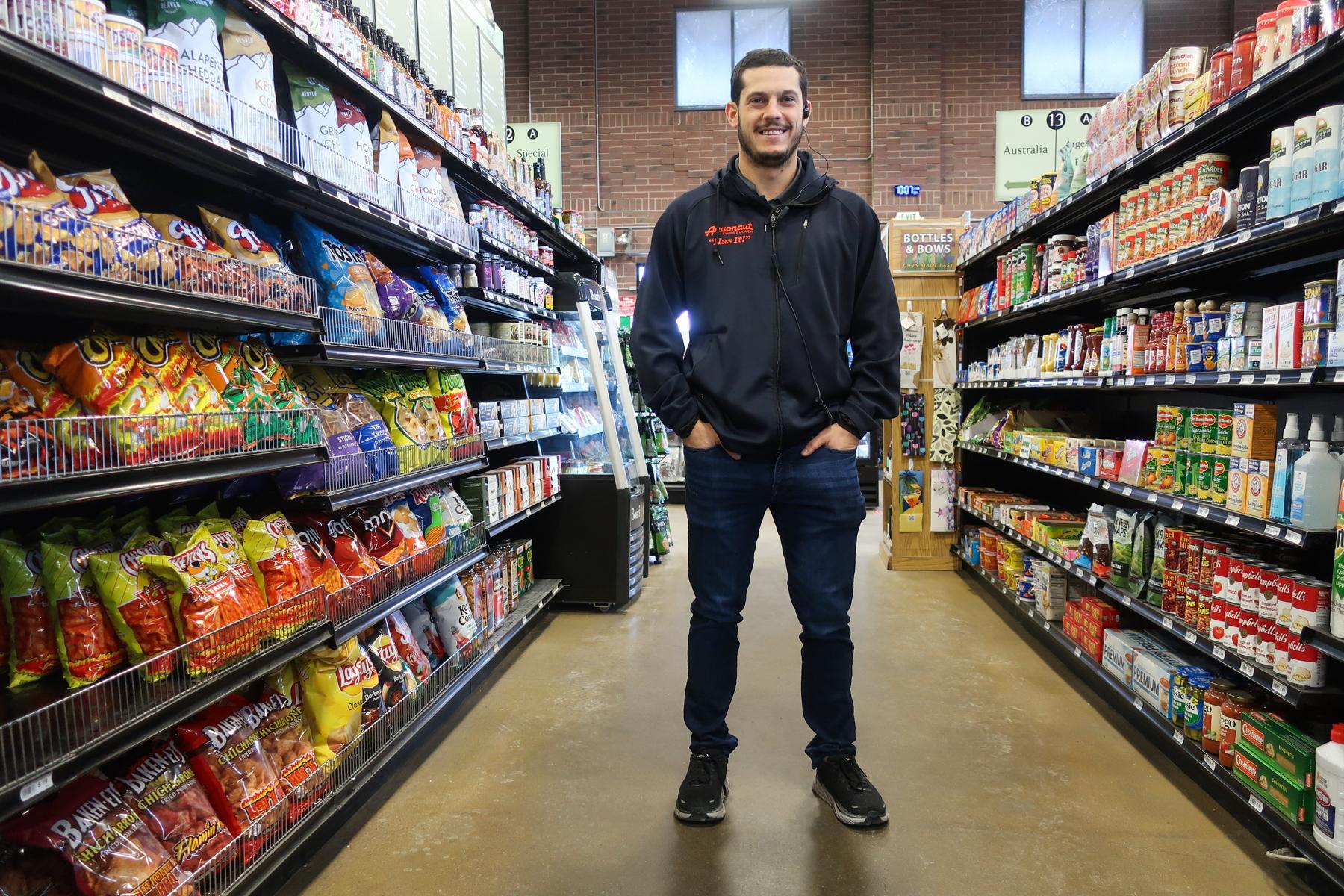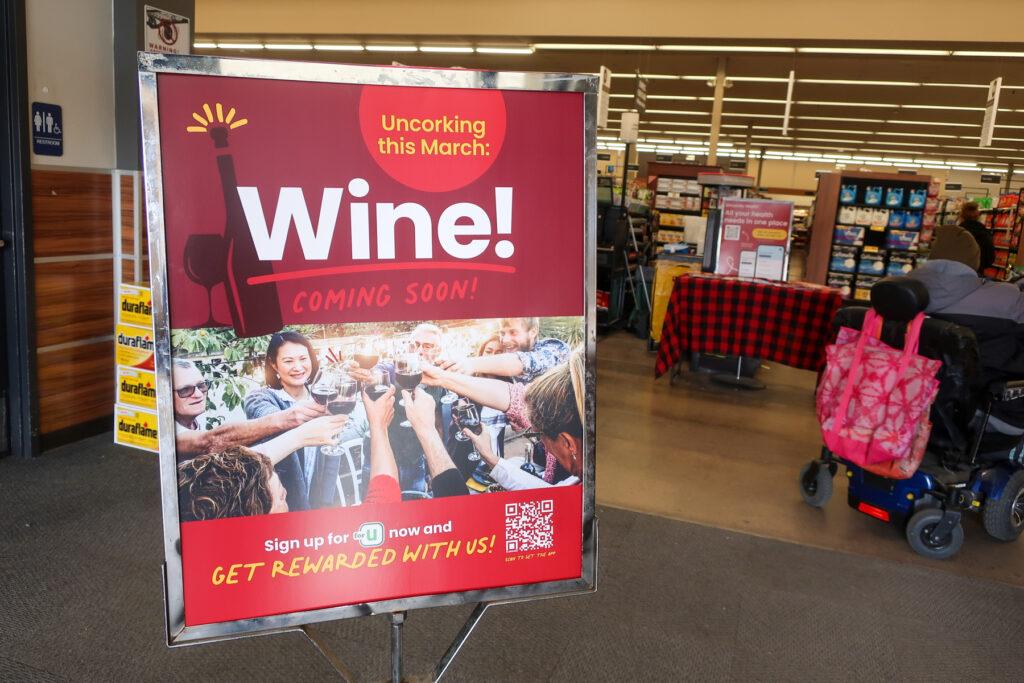
For four generations, Argonaut Wine & Liquor in Denver has thrived on selling every kind of booze under the sun. But in early February, president Josh Robinson added a new type of aisle near the front of the store: food.
Now, customers can grab frozen pizza or barbeque supplies on top of wine or their favorite vodka.
Robinson made the expansion in an attempt to stay competitive amid a major shake-up in Colorado’s liquor industry: Large grocery chains across the state can start selling wine on March 1.
Big box stores from King Soopers to Safeway to Walmart plan to stock their shelves with wine at 8 a.m. on the 1st, which is as soon as the new law allows. Independent, family-owned liquor stores like Argonaut worry customers will take notice and change their shopping habits, which could deal a deadly blow to their bottom line.
The change is happening due to the outcome of last November’s election. Voters narrowly passed Proposition 125, which expands grocery stores’ liquor licenses for full strength beer to cover wine. Convenience stores with beer licenses, such as 7-Eleven, can also start to sell wine.
Most supermarkets will still be barred from selling hard alcohol.
Wine is a major part of liquor store sales, because customers buy it more frequently than other types of alcoholic drinks, according to shop owners. At least 40% of annual sales at Argonaut are from wine alone, Robinson said.
“I know of at least four or five independent (liquor) stores that have already shut their doors,” he said. “We're just hoping that enough of us survive to be able to keep up and be able to compete on something besides convenience of big grocery chains.”
On top of the new food aisle, Argonaut is making other big changes.
The store has had to lay off about a dozen workers in anticipation of the drop in wine sales. Robinson hopes keeping a few trained sommeliers on staff as well as increasing the store’s selection of trendy hard liquors and mixed drinks will keep people coming in the doors.
“If people are worried about their wine store, make the extra stop and see them. Or they won’t be there anymore,” he said.
National grocery chains and tech companies were the main proponents of Prop 125.
National companies spent millions to promote the effort as a way to offer more convenience and bring Colorado in line with most other states’ liquor laws around grocery store sales. It inched out a victory by just 28,000 votes, mainly due to support from Front Range residents in Denver and El Paso counties.

In the months since, grocery chains have cleared entire aisles in their stores in anticipation of March 1. Many have advertised the change in large banners in front of stores and online, promising a wide selection of national brands.
Industry groups representing small businesses in Colorado have called the changes a doomsday scenario for independent wine and liquor sellers, especially smaller operations that set up their shops directly across the street from a King Soopers or Safeway to catch customers on their weekly grocery runs.
“Those are the ones that we’re really concerned for,” said Chris Fine, executive director of the Colorado Licensed Beverage Association, the state’s largest association of independent liquor stores.
Many stores are still recovering from a rollercoaster in revenue changes due to changes in Colorado liquor law in 2019 that allowed grocery stores to start selling full strength beer. The COVID-19 pandemic led to a temporary spike in liquor and wine sales, which has since slumped, Fine said.
CLBA now predicts as many as “a quarter to a third” of the state’s roughly 1,600 independent liquor stores could be pushed over the edge once grocers start to siphon off wine revenue.
“It might not come at the flip of a switch in March,” Fine said. “But when you build your business on three pieces of the pie, (liquor, wine and beer), it makes it difficult for a small business to weather this.”
Many of those stores are owned by immigrant families and second-generation Americans who are carrying on a family business.
Beer sales at Grape Leaf Fine Wines and Spirits in Denver’s Central Park neighborhood have tumbled about 20% since 2019, said Omar Malik, the co-owner.
Malik’s family immigrated to the United States in the 60s and has run liquor stores in the city for decades. He’s weathered the decline in beer laws pretty easily, he said.
But wine won’t be the same, he said. It makes up about 80% of his annual sales.
“I'm personally bracing for an even more drastic loss around the wines,” Malik said. “All these changes are a slow erosion of small business in Colorado.”
Now Malik is looking at offering more food and candy in his store, along with specialty liquor options. He’s also hoping to increase his delivery options in the Central Park neighborhood to reach more customers.
“We will fight it out to the end for sure,” he said. “We’re going to have to focus on harder-to-get allocated wines, and we love finding those new things. But we definitely are going to have to do more of it.”
Wine sales going to grocery stores won’t be the last shift residents see in Colorado liquor laws. Legislation that passed in 2016 is also on track to allow retailers to up the number of locations that can sell hard liquor.
Currently, grocery store chains that have a built-in pharmacy can have up to 8 stores with liquor licenses statewide. That number will jump to 13 by 2027, Fine, the CLBA director, said.
“Smaller stores are going to have to start tightening their belts even more,” Fine said.
Owners of stores say they’ll have to spend more on advertising to survive and remind customers about supporting local businesses. They say they’re encouraged by the large number of Coloradans who voted against Prop 125.
Residents also voted down two other measures that would have hurt small liquor businesses by expanding online delivery app rules and increasing the number of franchises liquor stores can have.
“We knew it was gonna be a David and Goliath fight,” Robinson, the president of Argonaut, said. “To beat two out of the three, which most people didn't think we could do, we were super proud of that.”
Some customers of specialty stores say they appreciate the wider selection. On a recent afternoon, Kathleen Schoen walked out of Argonaut carrying two bottles of Chardonnay and Merlot.
She voted against Prop 125 and worries it’ll be harder to find her favorite wine if specialty stores close down.
“They’re non-alcoholic wines,” Schoen said. “I doubt grocery stores will have that.”









